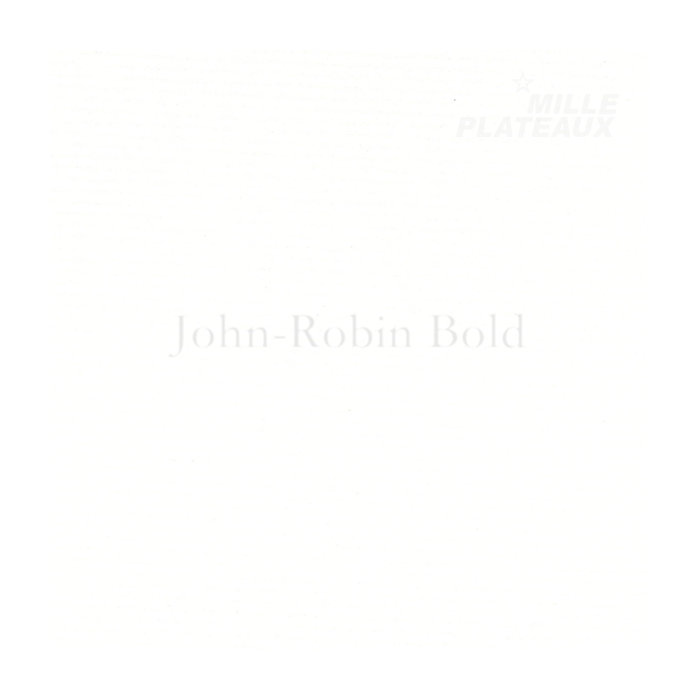MP8 John-Robin Bold (Mille Plateaux)
Where do we find a point of such realization of a social that it is also the point of its collapse? It’s exactly like the stereophonic effect. We are all obsessed – and not only in music – with high fidelity; obsessed with the quality of musical (re-)production. Armed with the tuners, amplifiers and speakers of our stereo systems we adjust bass and treble, we mix, we combine, we multiply tracks in search of an impeccable technology and an infallible music. Where is the degree of technological sophistication, where is the high-fidelity threshold beyond which music as such would disappear? For the problem of the disappearance of music is the same as that of the disappearance of history. It will not disappear for a want of music. It will disappear for having exceeded that limit point, vanishing point, it will disappear in the perfection of its materiality, in its own special effect beyond which there is no longer any aesthetic judgement or aesthetic pleasure: It is the ecstasy of musicality and its end.”
“You describe the system, the most catastrophic or apocalyptic system but you can do that in a form that is not at all apocalyptic, that is very (maybe) singular. The form can contain and retain the singularity in the same time as it says something that is not singularity but it describes the non-singularity but the form must remain singular.
Order here
Review from His Voice:
John-Robin Bold’s Liberated Music
Jan 30, 2020 Martin Lauer
The resurrected iconic brand of experimental electronics Force Inc./Mille Plateaux releases a nameless album by the German classical guitarist and electronic music creator John-Robin Bold, who tries to free the music from the technological trap we have thrown it into, thus preventing its self-destruction.
The work, consisting of twenty tracks marked only by numbers, introduces a recording from a lecture by French philosopher Jean Baudrillard, in which this author of many books and a treatise on virtual reality and hyperreality postulates the end of music as an art capable of evoking aesthetic impressions in us, due to our increasing technological demands on its quality. Thus, if Bold sets out the difficult task of “saving” music from its autophagy, it is necessary to realize that it uses the techniques of abstraction and deconstruction that were at the beginning of this process of eroding the music begun by the breakthrough of musique concrète discoveries.
In the first ten tracks of the album, Bold has blurred the unprecedented forms of mainstream pop music over the past decade. He cleaves the source recordings into ambient timeless surfaces, cuts into stubborn loops, and unfolds into glitch lumps, each achieving an absolutely unique character and progress. Track 2 depicts an arctic landscape with increasing vocals that shatters its icy surface into thousands of shards. 6 resembles a disco that has degenerated into a duel between a dozen DJs over who can play a more striking beat, and the following 7 offer a conciliatory to meditative tune-up.
With track 10, which with its lo-fi noise intertwined here and there with heavily distorted hollow punches reminiscent of an inadvertently recorded recording made by an older cell phone, we jump into the second half of the album, featuring spiritual vocal music from 1200-1600. The divide, however, is rather imaginary, because in terms of expression, we are not far from the established territory. At 13, we find ourselves in a noisy factory, where we can see a rustling clank of machines on all sides. At 16, church bells echo from behind a thousand voiced angelic choir, and 17 continues in the smooth ambient plane of expanding vocals. Indeed, as we move towards the final number 20, the sound manifestations are lessening, becoming more gentle, and the mood more introspective, as if sacred music really spoke to us from behind its hazy textures. In the final 20, again Baudrillard’s voice is heard, reassessing teleological reasoning and the causality and chronology of historical development, adding that overcoming this thinking would lead to a reversal of the flow of time. Bold aptly disrupts the linearity of our listening and remakes the end of the album to its beginning.
The album features fast-changing moods and is full of dramatic volume changes. Bold often throws us into the ruthless turmoil that is ruthlessly attacking us, and we can hardly manage the orientation of this sonic morass. His concept of noise, however, is carefully thought out beforehand and is far removed from the first-thunderous boisterous ethos of the noise rebels. During the second and subsequent listening we begin to realize that under seemingly impenetrable dominant sound events there are often other, subtler and often more interesting colours. This album shows a fantastic plasticity and, above all it is guaranteed that even after repeated listening it will not get tired.

